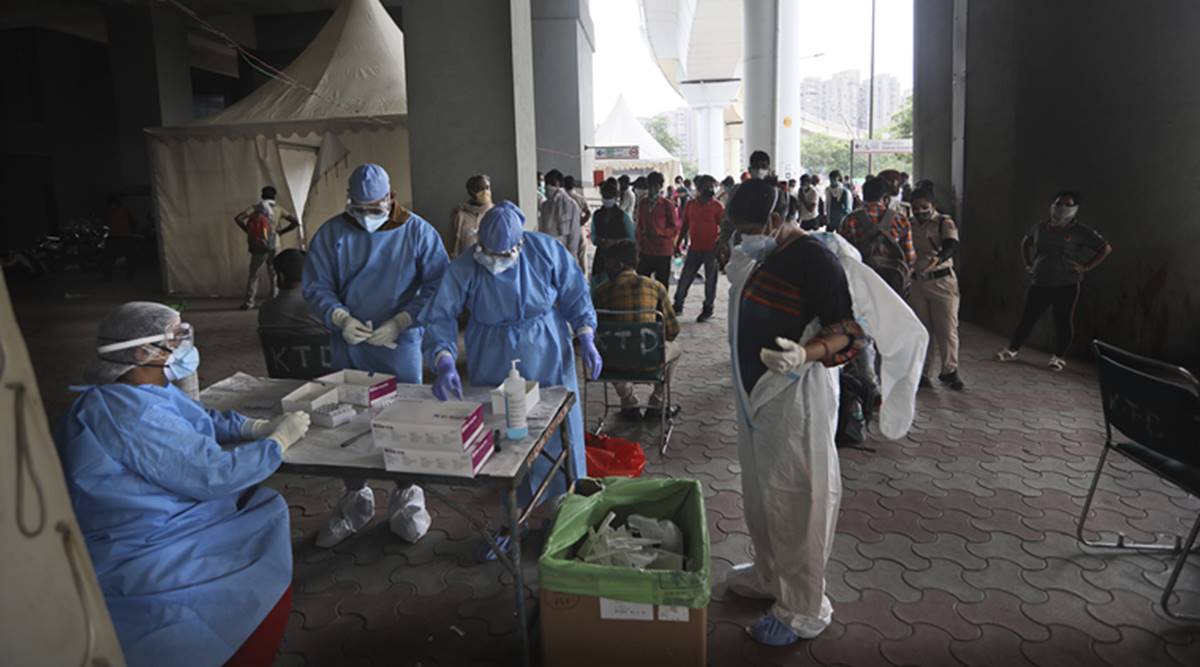 Migrant laborers returning to the city for work undergo COVID-19 test in New Delhi, India, Tuesday, Aug. 18, 2020. A nationwide coronavirus lockdown imposed by the government on March 25 caused many impoverished migrant workers in cities to lose their jobs. Many made grueling and dangerous trips back to their hometowns, with most public transport including trains halted under the lockdown. (AP Photo/Manish Swarup)
Migrant laborers returning to the city for work undergo COVID-19 test in New Delhi, India, Tuesday, Aug. 18, 2020. A nationwide coronavirus lockdown imposed by the government on March 25 caused many impoverished migrant workers in cities to lose their jobs. Many made grueling and dangerous trips back to their hometowns, with most public transport including trains halted under the lockdown. (AP Photo/Manish Swarup)The Delhi government has prepared SOPs to provide oxygen concentrators to patients who have recovered from Covid-19 but continue to face breathing difficulties.
According to officials, the state health department will provide 10 oxygen concentrators — a device that makes oxygen from air — to each of the 11 districts, and two will be placed in each government-run dispensary. There are 3,000 oxygen concentrators with the state health department, said sources.
District medical teams will be at the forefront in coordinating with patients who need the machine.

“Some district officials have already started collecting the machines. The process will start depending on requirement of patients. The machine can be provided for a maximum duration of two months, after which it has to be returned to the facility concerned,” said a senior official from the state health department.
Last week, Chief Minister Arvind Kejriwal had stated that there have been instances where some patients lost their lives after testing negative as their oxygen levels fell. To address the issue, he said oxygen concentrators will be sent to homes of recovered Covid patients.
The guidelines will cover all recovered patients who were categorised as severe at the time of admission to ICUs of any government or a private facility. It will not include patients who are already on long-term oxygen therapy before being diagnosed with Covid, or those who have coexisting pulmonary illnesses.
“The hospitals will ensure that all eligible patients, at the time of discharge, are informed about getting a pulse oximeter from the nearest government dispensary. Oxygen levels of patients are to be monitored every six hours for 14 days after discharge, and a written record has to be maintained,” the official said.
A dedicated primary care team at the dispensary will initially visit patients and assess their need for oxygen concentrators. Oxygen levels of patients will be monitored for two weeks after discharge. If oxygen saturation level is less than 93% in two consecutive readings; less than 93% after three minutes of ambulation; or if the patient has nocturnal hypoxia with saturation levels less than 93%; then the patient is eligible for short-term oxygen therapy at home.
Voter ID will be required as proof of residence of the patient. The device will be sent to a patient based on a doctor’s prescription.
“The team will also follow-up with all patients on short-term oxygen therapy by calling daily and making weekly physical visits. This will continue till the requirement or two-month period ends, whichever is earlier. If the therapy is required for more than two months, the patient will be re-evaluated by a physician and prescribed long-term oxygen therapy as per the government policy,” added the official.
Meanwhile, Delhi recorded 1,250 new coronavirus cases on Friday, taking the city’s caseload to 1,58,604. The death toll rose to 4,270 with 13 more deaths reported in the last 24 hours.